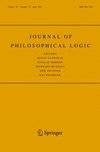Modal Information Logics: Axiomatizations and Decidability
IF 0.7
1区 哲学
0 PHILOSOPHY
引用次数: 0
Abstract
Abstract The present paper studies formal properties of so-called modal information logics (MILs)—modal logics first proposed in (van Benthem 1996) as a way of using possible-worlds semantics to model a theory of information. They do so by extending the language of propositional logic with a binary modality defined in terms of being the supremum of two states. First proposed in 1996, MILs have been around for some time, yet not much is known: (van Benthem 2017, 2019) pose two central open problems, namely (1) axiomatizing the two basic MILs of suprema on preorders and posets, respectively, and (2) proving (un)decidability. The main results of the first part of this paper are solving these two problems: (1) by providing an axiomatization [with a completeness proof entailing the two logics to be the same], and (2) by proving decidability. In the proof of the latter, an emphasis is put on the method applied as a heuristic for proving decidability ‘via completeness’ for semantically introduced logics; the logics lack the FMP w.r.t. their classes of definition, but not w.r.t. a generalized class. These results are build upon to axiomatize and prove decidable the MILs attained by endowing the language with an ‘informational implication’—in doing so a link is also made to the work of (Buszkowski 2021) on the Lambek Calculus.

模态信息逻辑:公理化和可判定性
摘要本文研究所谓模态信息逻辑(mls)的形式性质,模态逻辑最早是在(van Benthem 1996)中提出的,是一种使用可能世界语义来建模信息理论的方法。他们这样做是通过用二元模态来扩展命题逻辑的语言,二元模态被定义为两种状态的最高。mil于1996年首次提出,已经存在了一段时间,但所知甚少:(van Benthem 2017, 2019)提出了两个核心开放问题,即(1)分别对预定和偏序集上的两个基本mil进行公理化,以及(2)证明(非)可判定性。本文第一部分的主要结果是解决了这两个问题:(1)通过提供公理化[包含两个逻辑相同的完备性证明],以及(2)通过证明可判定性。在后者的证明中,重点放在作为启发式方法应用于“通过完备性”证明语义引入逻辑的可判决性;逻辑缺乏定义类的FMP,但不是泛化类。这些结果是建立在公理化和证明可确定的基础上的,通过赋予语言“信息暗示”来获得mil——这样做也与(Buszkowski 2021)在Lambek演算上的工作联系起来。
本文章由计算机程序翻译,如有差异,请以英文原文为准。
求助全文
约1分钟内获得全文
求助全文
来源期刊

JOURNAL OF PHILOSOPHICAL LOGIC
PHILOSOPHY-
CiteScore
2.50
自引率
20.00%
发文量
43
期刊介绍:
The Journal of Philosophical Logic aims to provide a forum for work at the crossroads of philosophy and logic, old and new, with contributions ranging from conceptual to technical. Accordingly, the Journal invites papers in all of the traditional areas of philosophical logic, including but not limited to: various versions of modal, temporal, epistemic, and deontic logic; constructive logics; relevance and other sub-classical logics; many-valued logics; logics of conditionals; quantum logic; decision theory, inductive logic, logics of belief change, and formal epistemology; defeasible and nonmonotonic logics; formal philosophy of language; vagueness; and theories of truth and validity. In addition to publishing papers on philosophical logic in this familiar sense of the term, the Journal also invites papers on extensions of logic to new areas of application, and on the philosophical issues to which these give rise. The Journal places a special emphasis on the applications of philosophical logic in other disciplines, not only in mathematics and the natural sciences but also, for example, in computer science, artificial intelligence, cognitive science, linguistics, jurisprudence, and the social sciences, such as economics, sociology, and political science.
 求助内容:
求助内容: 应助结果提醒方式:
应助结果提醒方式:


